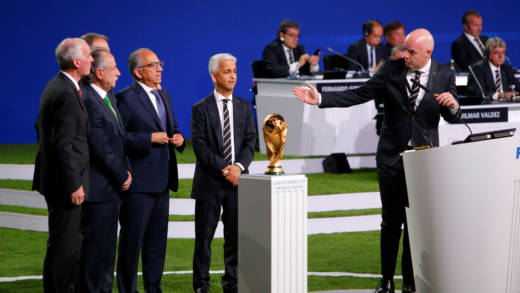The 2026 FIFA World Cup will be held in the U.S., Mexico and Canada, with a united bid from North America winning the right to host soccer's showcase event, the sport's world governing body decided on Wednesday. While the final cities selected to host games will be finalized over the next two years, San Francisco and Los Angeles are among the 17 cities in the U.S. being considered.
The united North American bid was selected over a competing bid from Morocco, in a vote among some 203 FIFA members that was held in Moscow on the eve of the 2018 World Cup, hosted by Russia. World Cup games start Thursday, but the U.S. men's team was eliminated in qualification and will not be competing. The tally was 134 votes for the united bid and 65 votes for Morocco.
"Thank you so, so very much for this incredible honor," Carlos Cordeiro, president of the U.S. Soccer Federation, said after the vote was taken. "Thank you for entrusting us with this privilege."
It will be the first time three countries have joined to host the World Cup — previously, South Korea and Japan had jointly hosted the 2002 Cup. The plan calls for the U.S. to host 60 matches, and its neighbors to host 10 each. A final list of 16 cities, across the three countries, will be finalized in 2021, but will likely include three in Mexico, three in Canada and the remaining 10 in the U.S. After some cities withdrew from bidding consideration, the list has been narrowed down to: Mexico City, Guadalajara and Monterrey (in Mexico); Edmonton, Montreal and Toronto (in Canada); and Boston, New York, Philadelphia, Baltimore, Washington, D.C., Atlanta, Nashville, Orlando, Miami, Cincinnati, Kansas City, Dallas, Houston, Denver, Los Angeles, San Francisco and Seattle (in the U.S.).
In San Francisco, games would be played at Levi's Stadium, and in Los Angeles, games would take place at either the Rose Bowl or the currently under construction NFL stadium in Inglewood or potentially the Coliseum in L.A.
